How External Audit Supports Corporate Governance: A Study
VerifiedAdded on 2022/10/09
|20
|5820
|15
Report
AI Summary
This report investigates the crucial relationship between external audits and corporate governance. It begins by defining the scope of the study, emphasizing the importance of external auditors in ensuring effective governance within an organization, especially in light of recent financial crises and the need for transparency. The rationale highlights the changing role of auditors, the importance of corporate governance, and the benefits of external audits. The research objectives and questions are clearly defined, focusing on how external audits support governance, the importance of the role over time, and the auditor's impact. A comprehensive literature review explores how external audits support corporate governance, the importance of external audits, and the role of external auditors in business organizations. The review cites various sources to illustrate the importance of external audits in ensuring reliable financial reporting, safeguarding shareholder interests, and managing risks. The study also focuses on the Sarbanes-Oxley Act and the role of auditors in detecting fraud and corruption. The report aims to provide a detailed understanding of the responsibilities of external auditors in maintaining good corporate governance.
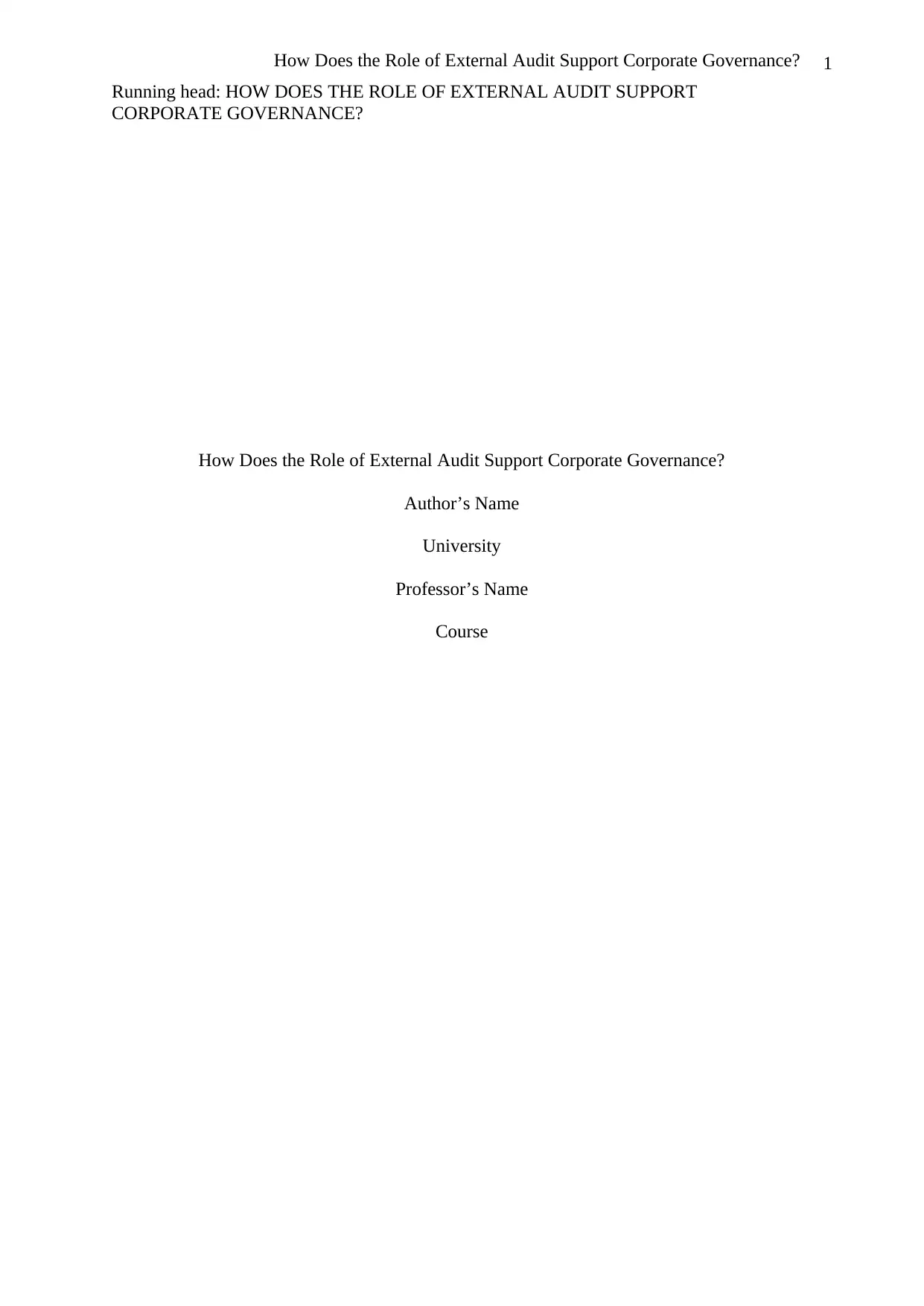
1How Does the Role of External Audit Support Corporate Governance?
Running head: HOW DOES THE ROLE OF EXTERNAL AUDIT SUPPORT
CORPORATE GOVERNANCE?
How Does the Role of External Audit Support Corporate Governance?
Author’s Name
University
Professor’s Name
Course
Running head: HOW DOES THE ROLE OF EXTERNAL AUDIT SUPPORT
CORPORATE GOVERNANCE?
How Does the Role of External Audit Support Corporate Governance?
Author’s Name
University
Professor’s Name
Course
Paraphrase This Document
Need a fresh take? Get an instant paraphrase of this document with our AI Paraphraser
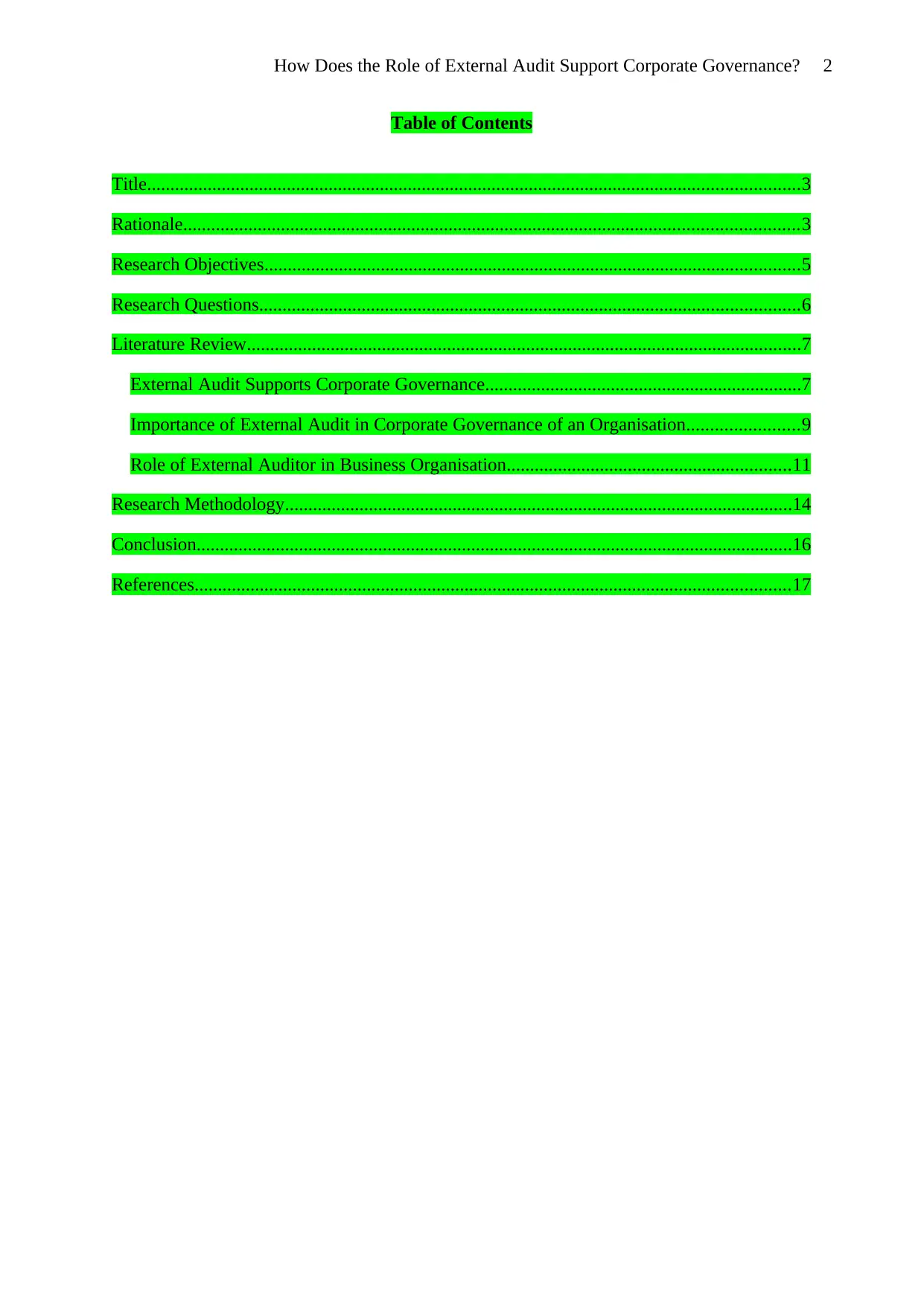
2How Does the Role of External Audit Support Corporate Governance?
Table of Contents
Title............................................................................................................................................3
Rationale....................................................................................................................................3
Research Objectives...................................................................................................................5
Research Questions....................................................................................................................6
Literature Review.......................................................................................................................7
External Audit Supports Corporate Governance....................................................................7
Importance of External Audit in Corporate Governance of an Organisation........................9
Role of External Auditor in Business Organisation.............................................................11
Research Methodology.............................................................................................................14
Conclusion................................................................................................................................16
References................................................................................................................................17
Table of Contents
Title............................................................................................................................................3
Rationale....................................................................................................................................3
Research Objectives...................................................................................................................5
Research Questions....................................................................................................................6
Literature Review.......................................................................................................................7
External Audit Supports Corporate Governance....................................................................7
Importance of External Audit in Corporate Governance of an Organisation........................9
Role of External Auditor in Business Organisation.............................................................11
Research Methodology.............................................................................................................14
Conclusion................................................................................................................................16
References................................................................................................................................17
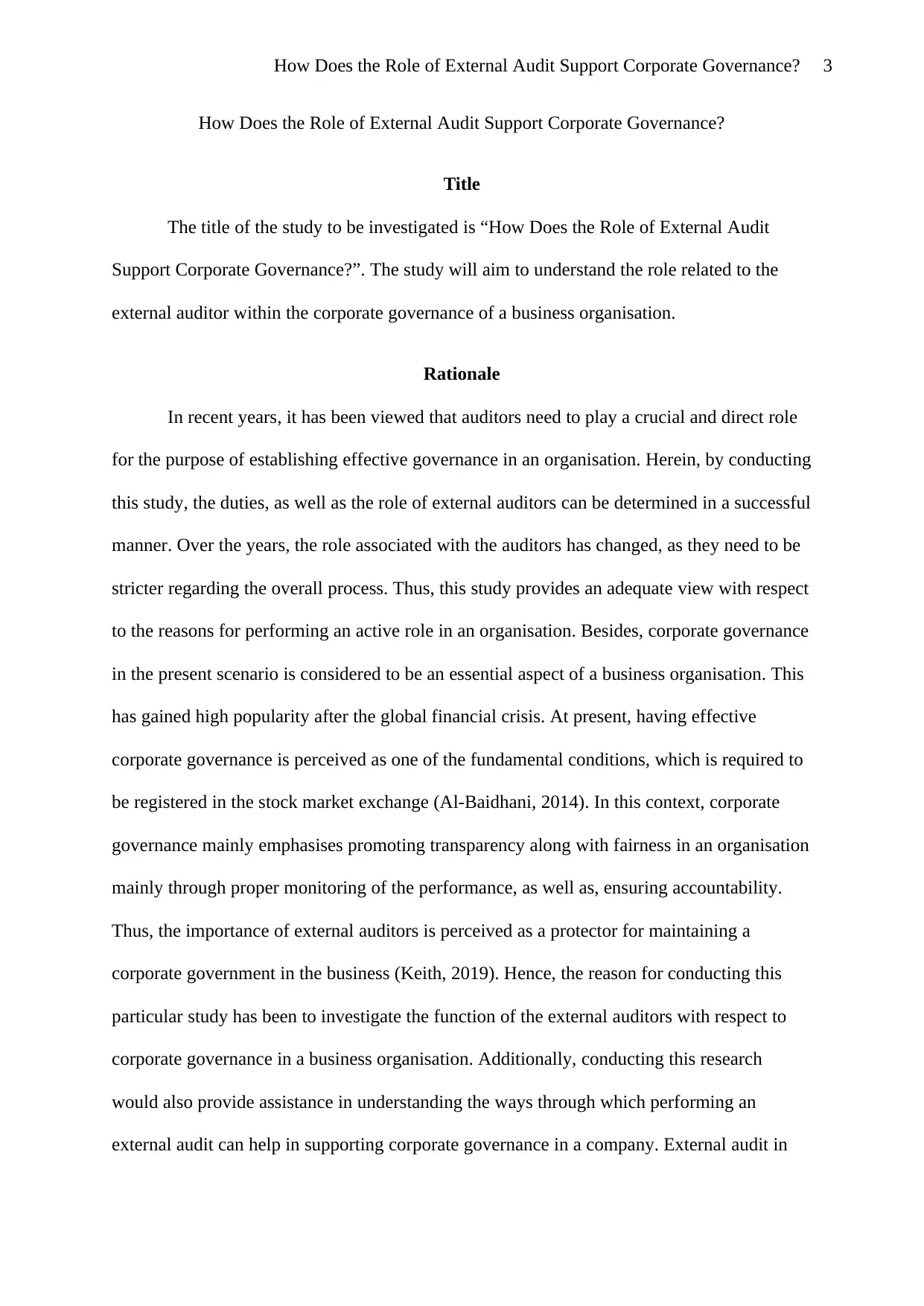
3How Does the Role of External Audit Support Corporate Governance?
How Does the Role of External Audit Support Corporate Governance?
Title
The title of the study to be investigated is “How Does the Role of External Audit
Support Corporate Governance?”. The study will aim to understand the role related to the
external auditor within the corporate governance of a business organisation.
Rationale
In recent years, it has been viewed that auditors need to play a crucial and direct role
for the purpose of establishing effective governance in an organisation. Herein, by conducting
this study, the duties, as well as the role of external auditors can be determined in a successful
manner. Over the years, the role associated with the auditors has changed, as they need to be
stricter regarding the overall process. Thus, this study provides an adequate view with respect
to the reasons for performing an active role in an organisation. Besides, corporate governance
in the present scenario is considered to be an essential aspect of a business organisation. This
has gained high popularity after the global financial crisis. At present, having effective
corporate governance is perceived as one of the fundamental conditions, which is required to
be registered in the stock market exchange (Al-Baidhani, 2014). In this context, corporate
governance mainly emphasises promoting transparency along with fairness in an organisation
mainly through proper monitoring of the performance, as well as, ensuring accountability.
Thus, the importance of external auditors is perceived as a protector for maintaining a
corporate government in the business (Keith, 2019). Hence, the reason for conducting this
particular study has been to investigate the function of the external auditors with respect to
corporate governance in a business organisation. Additionally, conducting this research
would also provide assistance in understanding the ways through which performing an
external audit can help in supporting corporate governance in a company. External audit in
How Does the Role of External Audit Support Corporate Governance?
Title
The title of the study to be investigated is “How Does the Role of External Audit
Support Corporate Governance?”. The study will aim to understand the role related to the
external auditor within the corporate governance of a business organisation.
Rationale
In recent years, it has been viewed that auditors need to play a crucial and direct role
for the purpose of establishing effective governance in an organisation. Herein, by conducting
this study, the duties, as well as the role of external auditors can be determined in a successful
manner. Over the years, the role associated with the auditors has changed, as they need to be
stricter regarding the overall process. Thus, this study provides an adequate view with respect
to the reasons for performing an active role in an organisation. Besides, corporate governance
in the present scenario is considered to be an essential aspect of a business organisation. This
has gained high popularity after the global financial crisis. At present, having effective
corporate governance is perceived as one of the fundamental conditions, which is required to
be registered in the stock market exchange (Al-Baidhani, 2014). In this context, corporate
governance mainly emphasises promoting transparency along with fairness in an organisation
mainly through proper monitoring of the performance, as well as, ensuring accountability.
Thus, the importance of external auditors is perceived as a protector for maintaining a
corporate government in the business (Keith, 2019). Hence, the reason for conducting this
particular study has been to investigate the function of the external auditors with respect to
corporate governance in a business organisation. Additionally, conducting this research
would also provide assistance in understanding the ways through which performing an
external audit can help in supporting corporate governance in a company. External audit in
⊘ This is a preview!⊘
Do you want full access?
Subscribe today to unlock all pages.

Trusted by 1+ million students worldwide
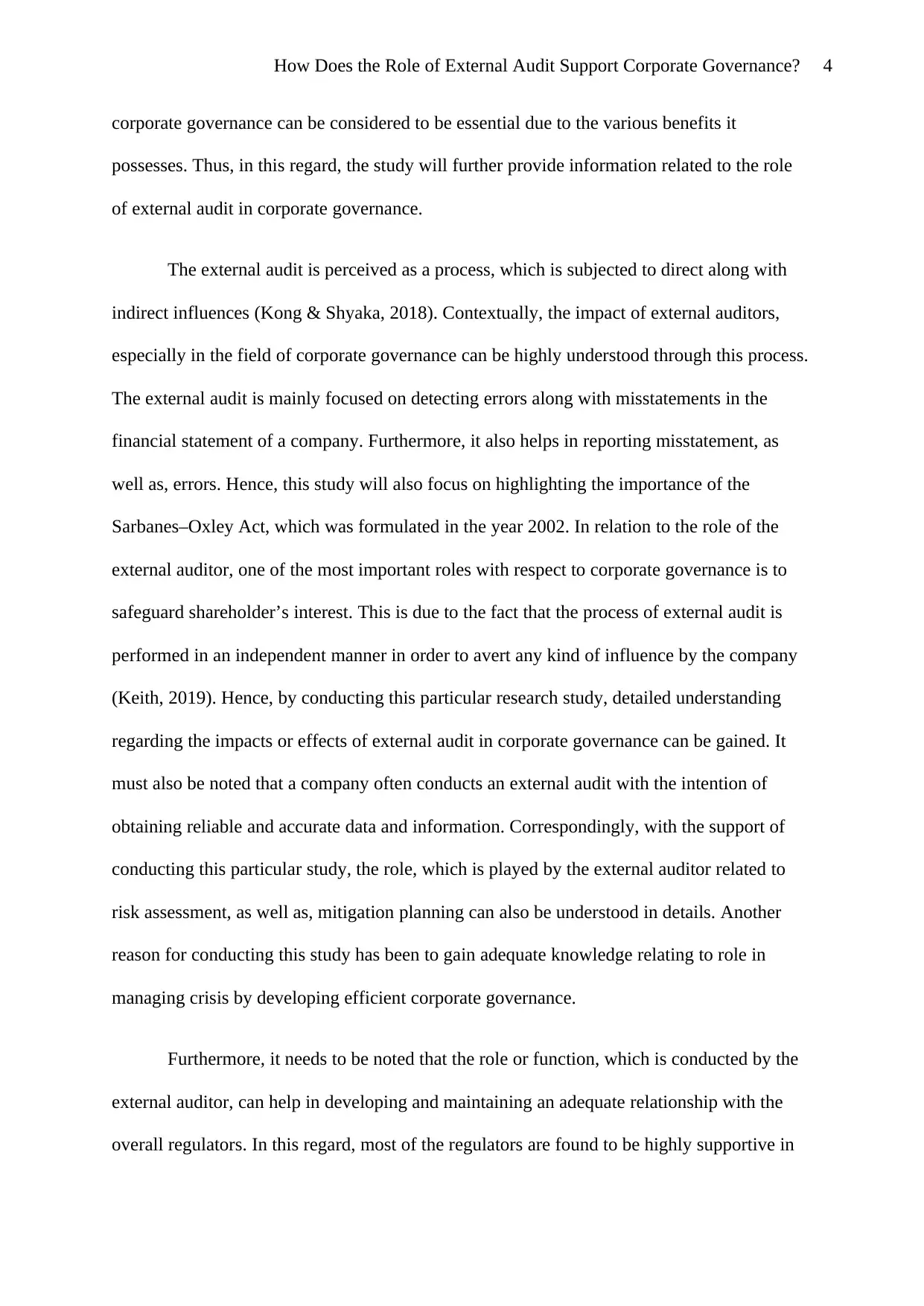
4How Does the Role of External Audit Support Corporate Governance?
corporate governance can be considered to be essential due to the various benefits it
possesses. Thus, in this regard, the study will further provide information related to the role
of external audit in corporate governance.
The external audit is perceived as a process, which is subjected to direct along with
indirect influences (Kong & Shyaka, 2018). Contextually, the impact of external auditors,
especially in the field of corporate governance can be highly understood through this process.
The external audit is mainly focused on detecting errors along with misstatements in the
financial statement of a company. Furthermore, it also helps in reporting misstatement, as
well as, errors. Hence, this study will also focus on highlighting the importance of the
Sarbanes–Oxley Act, which was formulated in the year 2002. In relation to the role of the
external auditor, one of the most important roles with respect to corporate governance is to
safeguard shareholder’s interest. This is due to the fact that the process of external audit is
performed in an independent manner in order to avert any kind of influence by the company
(Keith, 2019). Hence, by conducting this particular research study, detailed understanding
regarding the impacts or effects of external audit in corporate governance can be gained. It
must also be noted that a company often conducts an external audit with the intention of
obtaining reliable and accurate data and information. Correspondingly, with the support of
conducting this particular study, the role, which is played by the external auditor related to
risk assessment, as well as, mitigation planning can also be understood in details. Another
reason for conducting this study has been to gain adequate knowledge relating to role in
managing crisis by developing efficient corporate governance.
Furthermore, it needs to be noted that the role or function, which is conducted by the
external auditor, can help in developing and maintaining an adequate relationship with the
overall regulators. In this regard, most of the regulators are found to be highly supportive in
corporate governance can be considered to be essential due to the various benefits it
possesses. Thus, in this regard, the study will further provide information related to the role
of external audit in corporate governance.
The external audit is perceived as a process, which is subjected to direct along with
indirect influences (Kong & Shyaka, 2018). Contextually, the impact of external auditors,
especially in the field of corporate governance can be highly understood through this process.
The external audit is mainly focused on detecting errors along with misstatements in the
financial statement of a company. Furthermore, it also helps in reporting misstatement, as
well as, errors. Hence, this study will also focus on highlighting the importance of the
Sarbanes–Oxley Act, which was formulated in the year 2002. In relation to the role of the
external auditor, one of the most important roles with respect to corporate governance is to
safeguard shareholder’s interest. This is due to the fact that the process of external audit is
performed in an independent manner in order to avert any kind of influence by the company
(Keith, 2019). Hence, by conducting this particular research study, detailed understanding
regarding the impacts or effects of external audit in corporate governance can be gained. It
must also be noted that a company often conducts an external audit with the intention of
obtaining reliable and accurate data and information. Correspondingly, with the support of
conducting this particular study, the role, which is played by the external auditor related to
risk assessment, as well as, mitigation planning can also be understood in details. Another
reason for conducting this study has been to gain adequate knowledge relating to role in
managing crisis by developing efficient corporate governance.
Furthermore, it needs to be noted that the role or function, which is conducted by the
external auditor, can help in developing and maintaining an adequate relationship with the
overall regulators. In this regard, most of the regulators are found to be highly supportive in
Paraphrase This Document
Need a fresh take? Get an instant paraphrase of this document with our AI Paraphraser
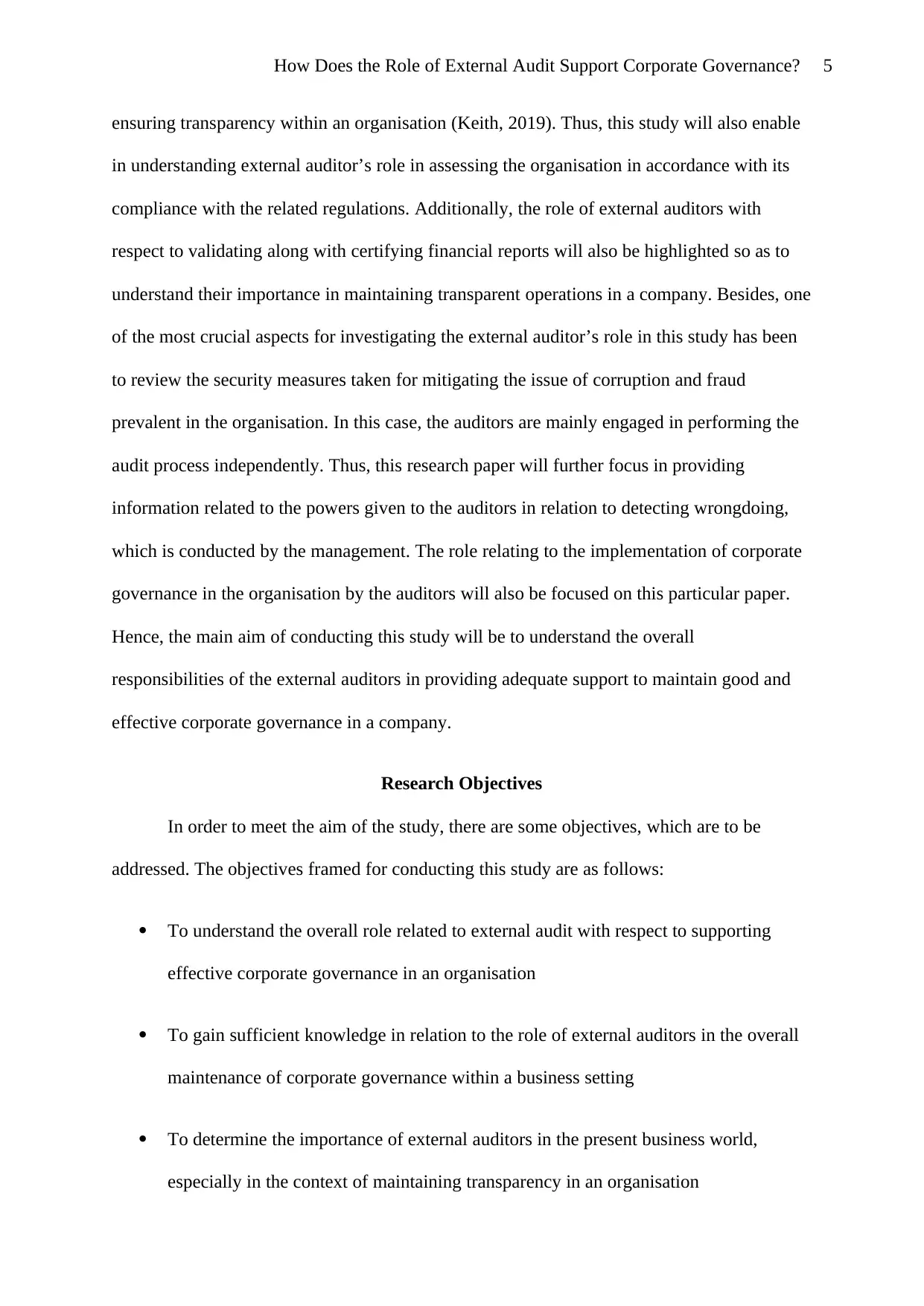
5How Does the Role of External Audit Support Corporate Governance?
ensuring transparency within an organisation (Keith, 2019). Thus, this study will also enable
in understanding external auditor’s role in assessing the organisation in accordance with its
compliance with the related regulations. Additionally, the role of external auditors with
respect to validating along with certifying financial reports will also be highlighted so as to
understand their importance in maintaining transparent operations in a company. Besides, one
of the most crucial aspects for investigating the external auditor’s role in this study has been
to review the security measures taken for mitigating the issue of corruption and fraud
prevalent in the organisation. In this case, the auditors are mainly engaged in performing the
audit process independently. Thus, this research paper will further focus in providing
information related to the powers given to the auditors in relation to detecting wrongdoing,
which is conducted by the management. The role relating to the implementation of corporate
governance in the organisation by the auditors will also be focused on this particular paper.
Hence, the main aim of conducting this study will be to understand the overall
responsibilities of the external auditors in providing adequate support to maintain good and
effective corporate governance in a company.
Research Objectives
In order to meet the aim of the study, there are some objectives, which are to be
addressed. The objectives framed for conducting this study are as follows:
To understand the overall role related to external audit with respect to supporting
effective corporate governance in an organisation
To gain sufficient knowledge in relation to the role of external auditors in the overall
maintenance of corporate governance within a business setting
To determine the importance of external auditors in the present business world,
especially in the context of maintaining transparency in an organisation
ensuring transparency within an organisation (Keith, 2019). Thus, this study will also enable
in understanding external auditor’s role in assessing the organisation in accordance with its
compliance with the related regulations. Additionally, the role of external auditors with
respect to validating along with certifying financial reports will also be highlighted so as to
understand their importance in maintaining transparent operations in a company. Besides, one
of the most crucial aspects for investigating the external auditor’s role in this study has been
to review the security measures taken for mitigating the issue of corruption and fraud
prevalent in the organisation. In this case, the auditors are mainly engaged in performing the
audit process independently. Thus, this research paper will further focus in providing
information related to the powers given to the auditors in relation to detecting wrongdoing,
which is conducted by the management. The role relating to the implementation of corporate
governance in the organisation by the auditors will also be focused on this particular paper.
Hence, the main aim of conducting this study will be to understand the overall
responsibilities of the external auditors in providing adequate support to maintain good and
effective corporate governance in a company.
Research Objectives
In order to meet the aim of the study, there are some objectives, which are to be
addressed. The objectives framed for conducting this study are as follows:
To understand the overall role related to external audit with respect to supporting
effective corporate governance in an organisation
To gain sufficient knowledge in relation to the role of external auditors in the overall
maintenance of corporate governance within a business setting
To determine the importance of external auditors in the present business world,
especially in the context of maintaining transparency in an organisation
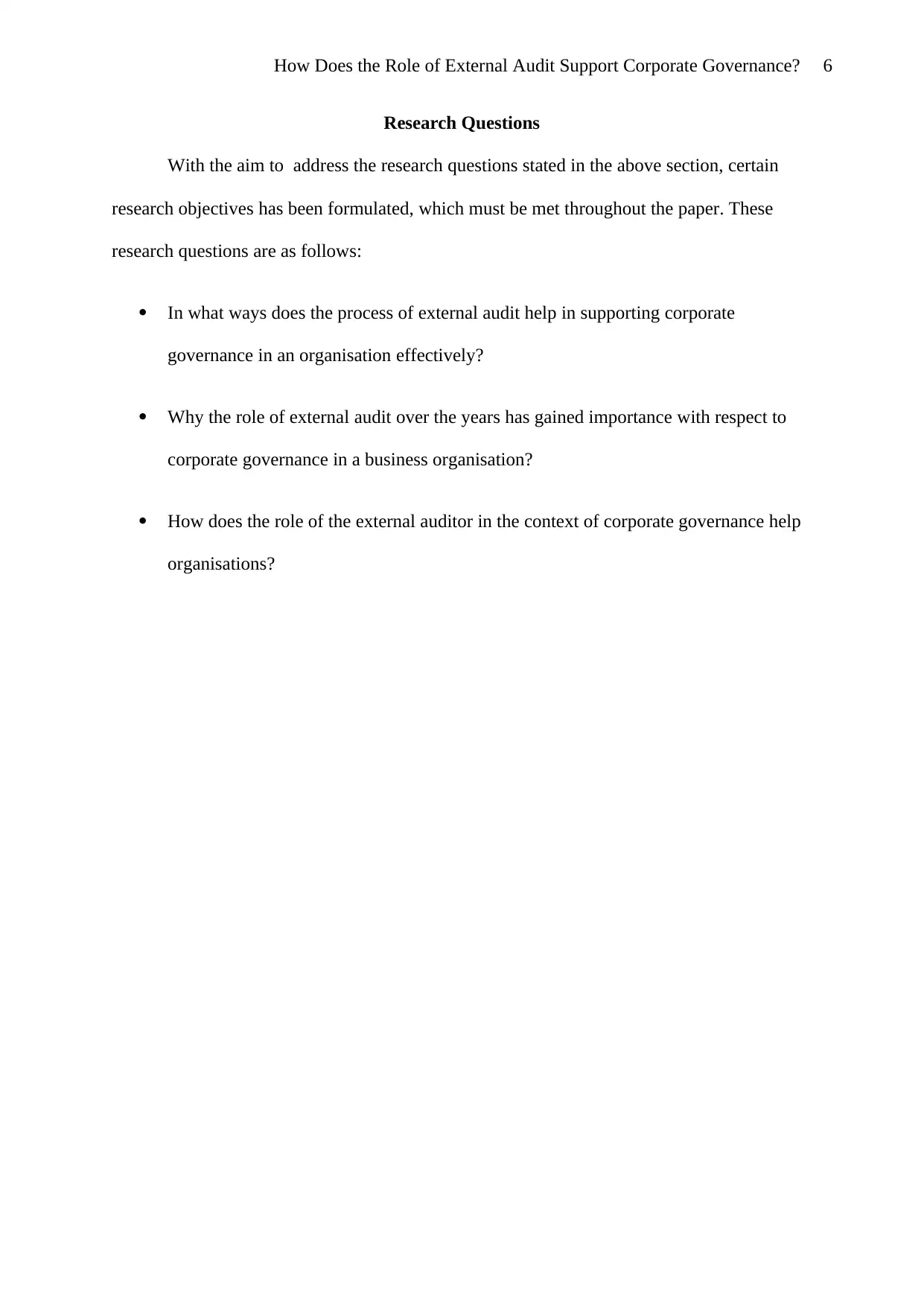
6How Does the Role of External Audit Support Corporate Governance?
Research Questions
With the aim to address the research questions stated in the above section, certain
research objectives has been formulated, which must be met throughout the paper. These
research questions are as follows:
In what ways does the process of external audit help in supporting corporate
governance in an organisation effectively?
Why the role of external audit over the years has gained importance with respect to
corporate governance in a business organisation?
How does the role of the external auditor in the context of corporate governance help
organisations?
Research Questions
With the aim to address the research questions stated in the above section, certain
research objectives has been formulated, which must be met throughout the paper. These
research questions are as follows:
In what ways does the process of external audit help in supporting corporate
governance in an organisation effectively?
Why the role of external audit over the years has gained importance with respect to
corporate governance in a business organisation?
How does the role of the external auditor in the context of corporate governance help
organisations?
⊘ This is a preview!⊘
Do you want full access?
Subscribe today to unlock all pages.

Trusted by 1+ million students worldwide
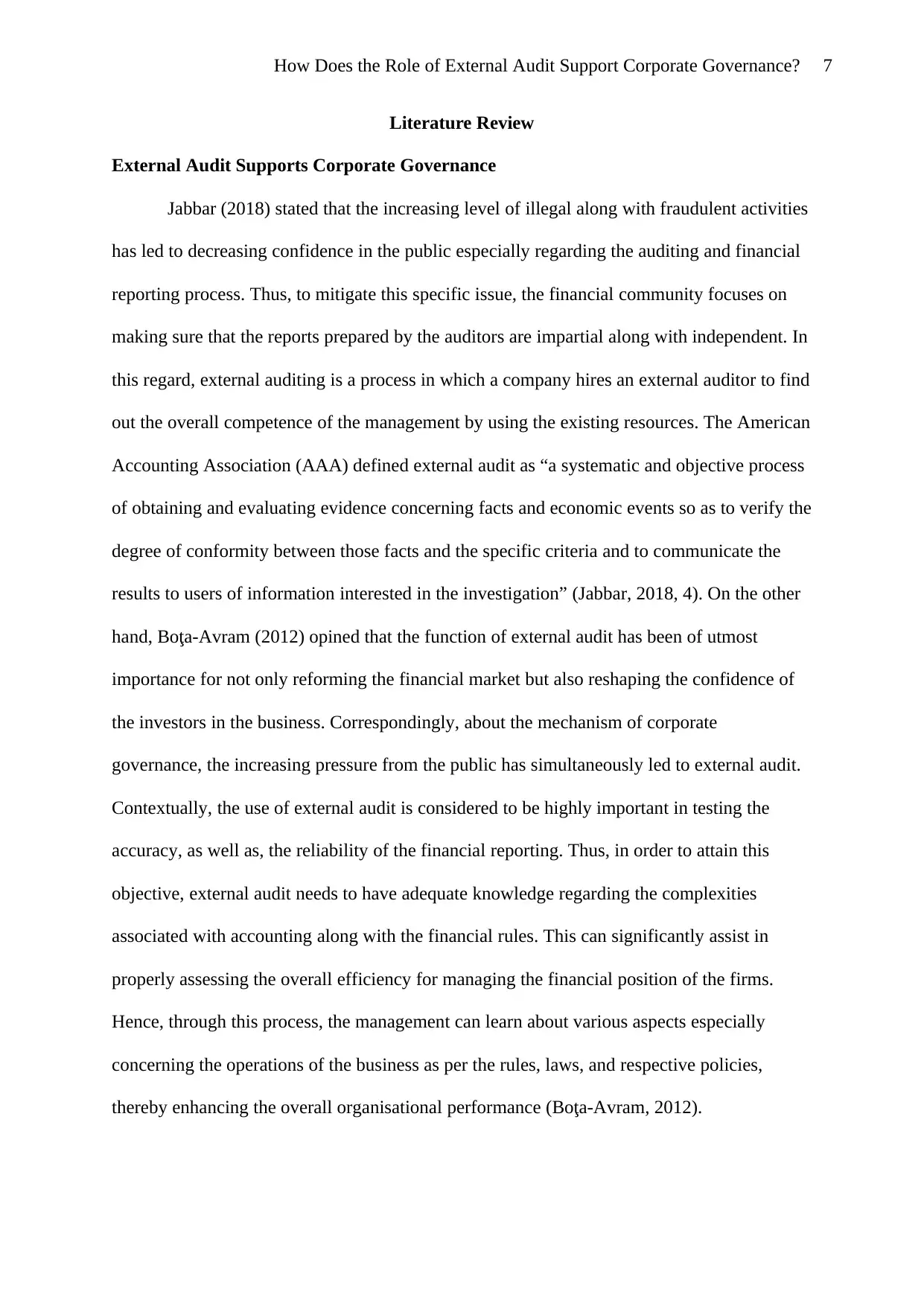
7How Does the Role of External Audit Support Corporate Governance?
Literature Review
External Audit Supports Corporate Governance
Jabbar (2018) stated that the increasing level of illegal along with fraudulent activities
has led to decreasing confidence in the public especially regarding the auditing and financial
reporting process. Thus, to mitigate this specific issue, the financial community focuses on
making sure that the reports prepared by the auditors are impartial along with independent. In
this regard, external auditing is a process in which a company hires an external auditor to find
out the overall competence of the management by using the existing resources. The American
Accounting Association (AAA) defined external audit as “a systematic and objective process
of obtaining and evaluating evidence concerning facts and economic events so as to verify the
degree of conformity between those facts and the specific criteria and to communicate the
results to users of information interested in the investigation” (Jabbar, 2018, 4). On the other
hand, Boţa-Avram (2012) opined that the function of external audit has been of utmost
importance for not only reforming the financial market but also reshaping the confidence of
the investors in the business. Correspondingly, about the mechanism of corporate
governance, the increasing pressure from the public has simultaneously led to external audit.
Contextually, the use of external audit is considered to be highly important in testing the
accuracy, as well as, the reliability of the financial reporting. Thus, in order to attain this
objective, external audit needs to have adequate knowledge regarding the complexities
associated with accounting along with the financial rules. This can significantly assist in
properly assessing the overall efficiency for managing the financial position of the firms.
Hence, through this process, the management can learn about various aspects especially
concerning the operations of the business as per the rules, laws, and respective policies,
thereby enhancing the overall organisational performance (Boţa-Avram, 2012).
Literature Review
External Audit Supports Corporate Governance
Jabbar (2018) stated that the increasing level of illegal along with fraudulent activities
has led to decreasing confidence in the public especially regarding the auditing and financial
reporting process. Thus, to mitigate this specific issue, the financial community focuses on
making sure that the reports prepared by the auditors are impartial along with independent. In
this regard, external auditing is a process in which a company hires an external auditor to find
out the overall competence of the management by using the existing resources. The American
Accounting Association (AAA) defined external audit as “a systematic and objective process
of obtaining and evaluating evidence concerning facts and economic events so as to verify the
degree of conformity between those facts and the specific criteria and to communicate the
results to users of information interested in the investigation” (Jabbar, 2018, 4). On the other
hand, Boţa-Avram (2012) opined that the function of external audit has been of utmost
importance for not only reforming the financial market but also reshaping the confidence of
the investors in the business. Correspondingly, about the mechanism of corporate
governance, the increasing pressure from the public has simultaneously led to external audit.
Contextually, the use of external audit is considered to be highly important in testing the
accuracy, as well as, the reliability of the financial reporting. Thus, in order to attain this
objective, external audit needs to have adequate knowledge regarding the complexities
associated with accounting along with the financial rules. This can significantly assist in
properly assessing the overall efficiency for managing the financial position of the firms.
Hence, through this process, the management can learn about various aspects especially
concerning the operations of the business as per the rules, laws, and respective policies,
thereby enhancing the overall organisational performance (Boţa-Avram, 2012).
Paraphrase This Document
Need a fresh take? Get an instant paraphrase of this document with our AI Paraphraser
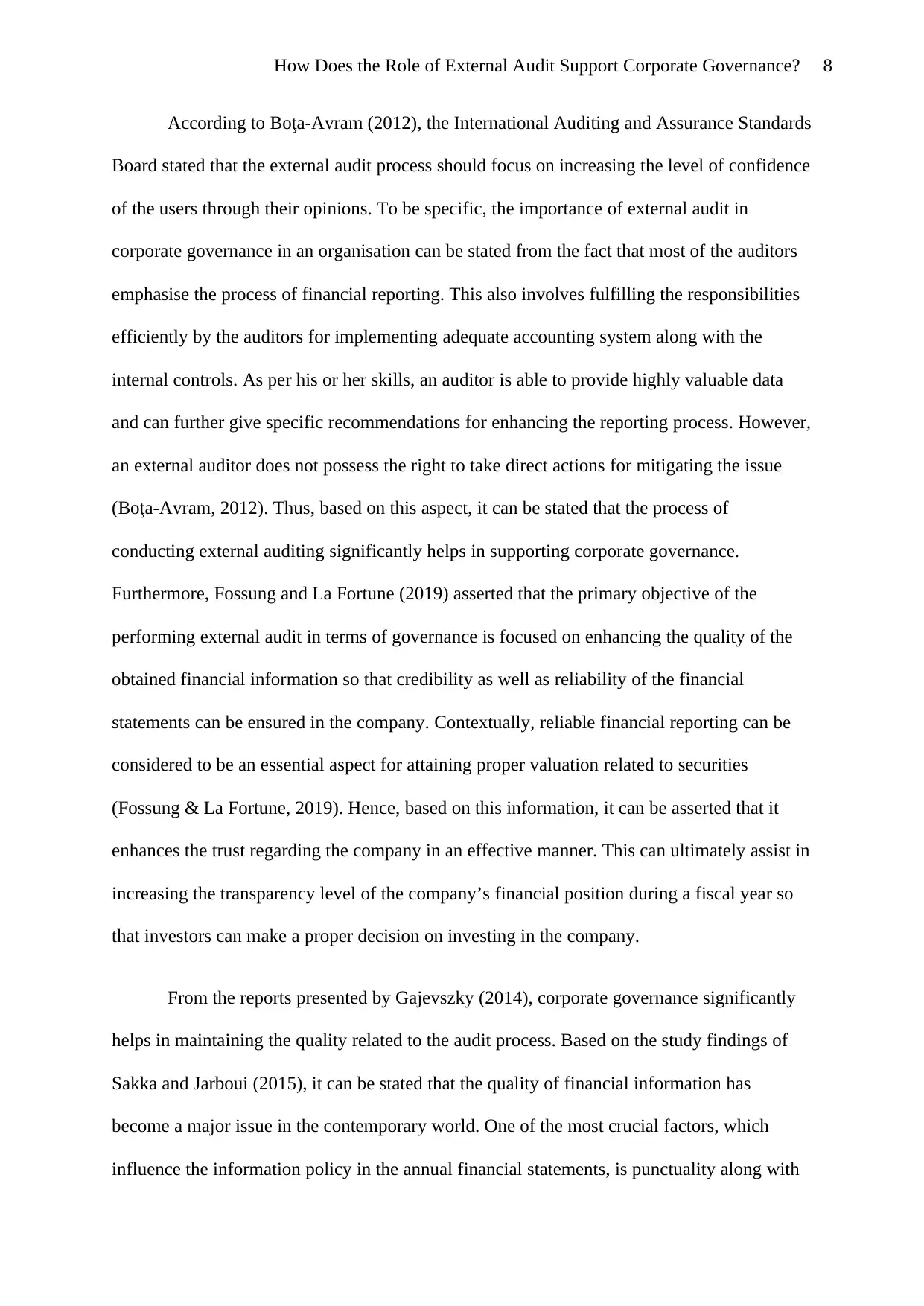
8How Does the Role of External Audit Support Corporate Governance?
According to Boţa-Avram (2012), the International Auditing and Assurance Standards
Board stated that the external audit process should focus on increasing the level of confidence
of the users through their opinions. To be specific, the importance of external audit in
corporate governance in an organisation can be stated from the fact that most of the auditors
emphasise the process of financial reporting. This also involves fulfilling the responsibilities
efficiently by the auditors for implementing adequate accounting system along with the
internal controls. As per his or her skills, an auditor is able to provide highly valuable data
and can further give specific recommendations for enhancing the reporting process. However,
an external auditor does not possess the right to take direct actions for mitigating the issue
(Boţa-Avram, 2012). Thus, based on this aspect, it can be stated that the process of
conducting external auditing significantly helps in supporting corporate governance.
Furthermore, Fossung and La Fortune (2019) asserted that the primary objective of the
performing external audit in terms of governance is focused on enhancing the quality of the
obtained financial information so that credibility as well as reliability of the financial
statements can be ensured in the company. Contextually, reliable financial reporting can be
considered to be an essential aspect for attaining proper valuation related to securities
(Fossung & La Fortune, 2019). Hence, based on this information, it can be asserted that it
enhances the trust regarding the company in an effective manner. This can ultimately assist in
increasing the transparency level of the company’s financial position during a fiscal year so
that investors can make a proper decision on investing in the company.
From the reports presented by Gajevszky (2014), corporate governance significantly
helps in maintaining the quality related to the audit process. Based on the study findings of
Sakka and Jarboui (2015), it can be stated that the quality of financial information has
become a major issue in the contemporary world. One of the most crucial factors, which
influence the information policy in the annual financial statements, is punctuality along with
According to Boţa-Avram (2012), the International Auditing and Assurance Standards
Board stated that the external audit process should focus on increasing the level of confidence
of the users through their opinions. To be specific, the importance of external audit in
corporate governance in an organisation can be stated from the fact that most of the auditors
emphasise the process of financial reporting. This also involves fulfilling the responsibilities
efficiently by the auditors for implementing adequate accounting system along with the
internal controls. As per his or her skills, an auditor is able to provide highly valuable data
and can further give specific recommendations for enhancing the reporting process. However,
an external auditor does not possess the right to take direct actions for mitigating the issue
(Boţa-Avram, 2012). Thus, based on this aspect, it can be stated that the process of
conducting external auditing significantly helps in supporting corporate governance.
Furthermore, Fossung and La Fortune (2019) asserted that the primary objective of the
performing external audit in terms of governance is focused on enhancing the quality of the
obtained financial information so that credibility as well as reliability of the financial
statements can be ensured in the company. Contextually, reliable financial reporting can be
considered to be an essential aspect for attaining proper valuation related to securities
(Fossung & La Fortune, 2019). Hence, based on this information, it can be asserted that it
enhances the trust regarding the company in an effective manner. This can ultimately assist in
increasing the transparency level of the company’s financial position during a fiscal year so
that investors can make a proper decision on investing in the company.
From the reports presented by Gajevszky (2014), corporate governance significantly
helps in maintaining the quality related to the audit process. Based on the study findings of
Sakka and Jarboui (2015), it can be stated that the quality of financial information has
become a major issue in the contemporary world. One of the most crucial factors, which
influence the information policy in the annual financial statements, is punctuality along with
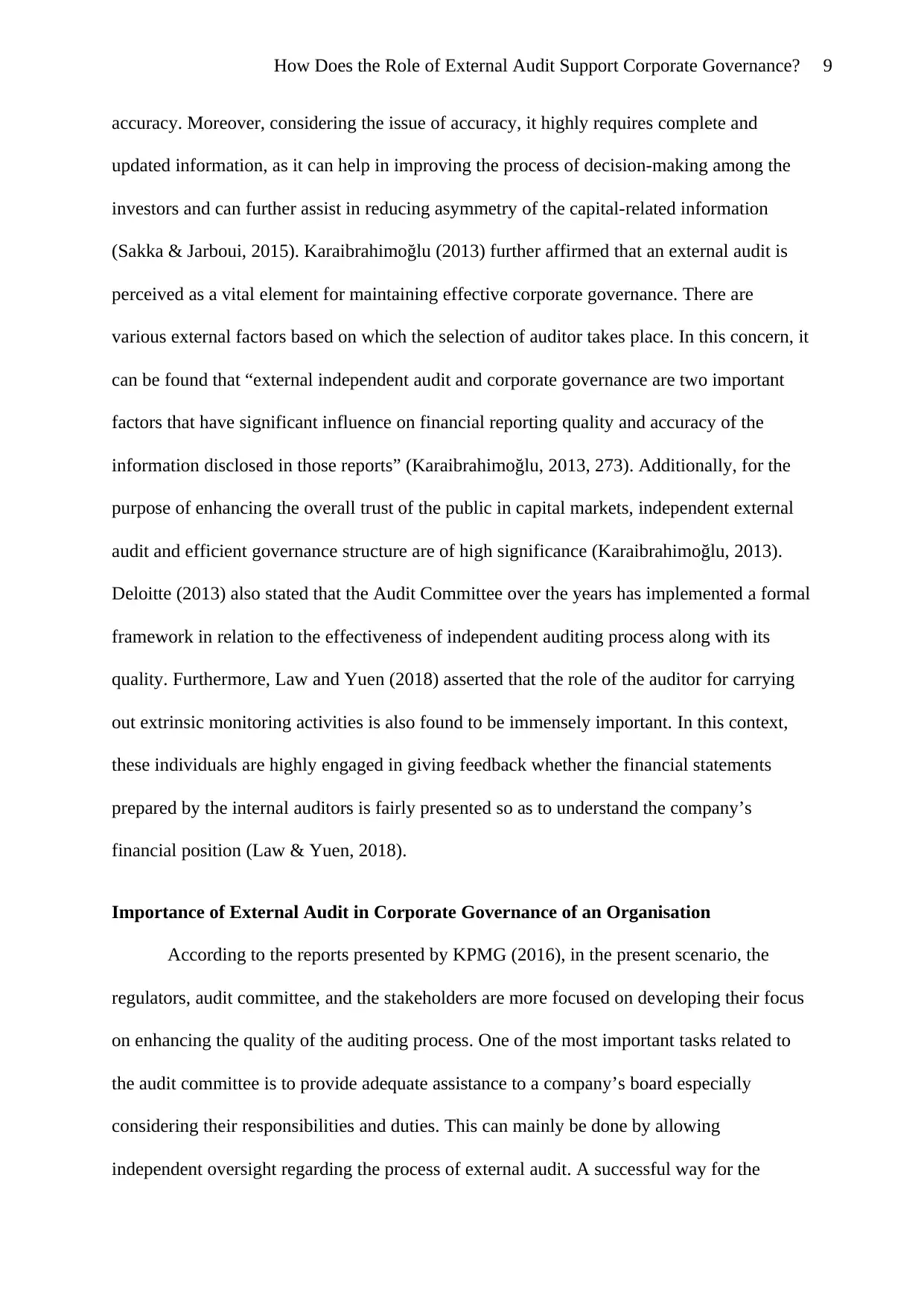
9How Does the Role of External Audit Support Corporate Governance?
accuracy. Moreover, considering the issue of accuracy, it highly requires complete and
updated information, as it can help in improving the process of decision-making among the
investors and can further assist in reducing asymmetry of the capital-related information
(Sakka & Jarboui, 2015). Karaibrahimoğlu (2013) further affirmed that an external audit is
perceived as a vital element for maintaining effective corporate governance. There are
various external factors based on which the selection of auditor takes place. In this concern, it
can be found that “external independent audit and corporate governance are two important
factors that have significant influence on financial reporting quality and accuracy of the
information disclosed in those reports” (Karaibrahimoğlu, 2013, 273). Additionally, for the
purpose of enhancing the overall trust of the public in capital markets, independent external
audit and efficient governance structure are of high significance (Karaibrahimoğlu, 2013).
Deloitte (2013) also stated that the Audit Committee over the years has implemented a formal
framework in relation to the effectiveness of independent auditing process along with its
quality. Furthermore, Law and Yuen (2018) asserted that the role of the auditor for carrying
out extrinsic monitoring activities is also found to be immensely important. In this context,
these individuals are highly engaged in giving feedback whether the financial statements
prepared by the internal auditors is fairly presented so as to understand the company’s
financial position (Law & Yuen, 2018).
Importance of External Audit in Corporate Governance of an Organisation
According to the reports presented by KPMG (2016), in the present scenario, the
regulators, audit committee, and the stakeholders are more focused on developing their focus
on enhancing the quality of the auditing process. One of the most important tasks related to
the audit committee is to provide adequate assistance to a company’s board especially
considering their responsibilities and duties. This can mainly be done by allowing
independent oversight regarding the process of external audit. A successful way for the
accuracy. Moreover, considering the issue of accuracy, it highly requires complete and
updated information, as it can help in improving the process of decision-making among the
investors and can further assist in reducing asymmetry of the capital-related information
(Sakka & Jarboui, 2015). Karaibrahimoğlu (2013) further affirmed that an external audit is
perceived as a vital element for maintaining effective corporate governance. There are
various external factors based on which the selection of auditor takes place. In this concern, it
can be found that “external independent audit and corporate governance are two important
factors that have significant influence on financial reporting quality and accuracy of the
information disclosed in those reports” (Karaibrahimoğlu, 2013, 273). Additionally, for the
purpose of enhancing the overall trust of the public in capital markets, independent external
audit and efficient governance structure are of high significance (Karaibrahimoğlu, 2013).
Deloitte (2013) also stated that the Audit Committee over the years has implemented a formal
framework in relation to the effectiveness of independent auditing process along with its
quality. Furthermore, Law and Yuen (2018) asserted that the role of the auditor for carrying
out extrinsic monitoring activities is also found to be immensely important. In this context,
these individuals are highly engaged in giving feedback whether the financial statements
prepared by the internal auditors is fairly presented so as to understand the company’s
financial position (Law & Yuen, 2018).
Importance of External Audit in Corporate Governance of an Organisation
According to the reports presented by KPMG (2016), in the present scenario, the
regulators, audit committee, and the stakeholders are more focused on developing their focus
on enhancing the quality of the auditing process. One of the most important tasks related to
the audit committee is to provide adequate assistance to a company’s board especially
considering their responsibilities and duties. This can mainly be done by allowing
independent oversight regarding the process of external audit. A successful way for the
⊘ This is a preview!⊘
Do you want full access?
Subscribe today to unlock all pages.

Trusted by 1+ million students worldwide
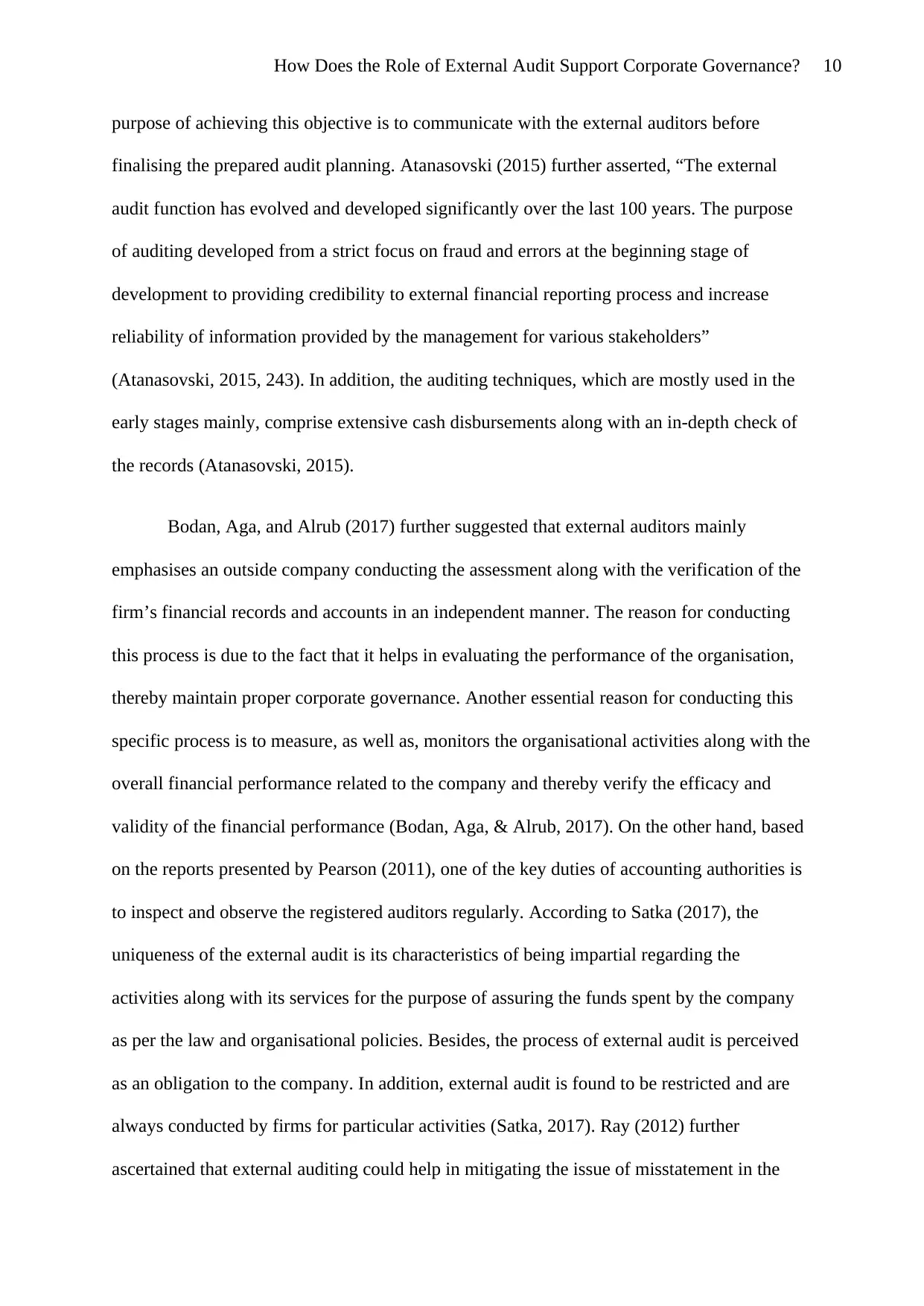
10How Does the Role of External Audit Support Corporate Governance?
purpose of achieving this objective is to communicate with the external auditors before
finalising the prepared audit planning. Atanasovski (2015) further asserted, “The external
audit function has evolved and developed significantly over the last 100 years. The purpose
of auditing developed from a strict focus on fraud and errors at the beginning stage of
development to providing credibility to external financial reporting process and increase
reliability of information provided by the management for various stakeholders”
(Atanasovski, 2015, 243). In addition, the auditing techniques, which are mostly used in the
early stages mainly, comprise extensive cash disbursements along with an in-depth check of
the records (Atanasovski, 2015).
Bodan, Aga, and Alrub (2017) further suggested that external auditors mainly
emphasises an outside company conducting the assessment along with the verification of the
firm’s financial records and accounts in an independent manner. The reason for conducting
this process is due to the fact that it helps in evaluating the performance of the organisation,
thereby maintain proper corporate governance. Another essential reason for conducting this
specific process is to measure, as well as, monitors the organisational activities along with the
overall financial performance related to the company and thereby verify the efficacy and
validity of the financial performance (Bodan, Aga, & Alrub, 2017). On the other hand, based
on the reports presented by Pearson (2011), one of the key duties of accounting authorities is
to inspect and observe the registered auditors regularly. According to Satka (2017), the
uniqueness of the external audit is its characteristics of being impartial regarding the
activities along with its services for the purpose of assuring the funds spent by the company
as per the law and organisational policies. Besides, the process of external audit is perceived
as an obligation to the company. In addition, external audit is found to be restricted and are
always conducted by firms for particular activities (Satka, 2017). Ray (2012) further
ascertained that external auditing could help in mitigating the issue of misstatement in the
purpose of achieving this objective is to communicate with the external auditors before
finalising the prepared audit planning. Atanasovski (2015) further asserted, “The external
audit function has evolved and developed significantly over the last 100 years. The purpose
of auditing developed from a strict focus on fraud and errors at the beginning stage of
development to providing credibility to external financial reporting process and increase
reliability of information provided by the management for various stakeholders”
(Atanasovski, 2015, 243). In addition, the auditing techniques, which are mostly used in the
early stages mainly, comprise extensive cash disbursements along with an in-depth check of
the records (Atanasovski, 2015).
Bodan, Aga, and Alrub (2017) further suggested that external auditors mainly
emphasises an outside company conducting the assessment along with the verification of the
firm’s financial records and accounts in an independent manner. The reason for conducting
this process is due to the fact that it helps in evaluating the performance of the organisation,
thereby maintain proper corporate governance. Another essential reason for conducting this
specific process is to measure, as well as, monitors the organisational activities along with the
overall financial performance related to the company and thereby verify the efficacy and
validity of the financial performance (Bodan, Aga, & Alrub, 2017). On the other hand, based
on the reports presented by Pearson (2011), one of the key duties of accounting authorities is
to inspect and observe the registered auditors regularly. According to Satka (2017), the
uniqueness of the external audit is its characteristics of being impartial regarding the
activities along with its services for the purpose of assuring the funds spent by the company
as per the law and organisational policies. Besides, the process of external audit is perceived
as an obligation to the company. In addition, external audit is found to be restricted and are
always conducted by firms for particular activities (Satka, 2017). Ray (2012) further
ascertained that external auditing could help in mitigating the issue of misstatement in the
Paraphrase This Document
Need a fresh take? Get an instant paraphrase of this document with our AI Paraphraser
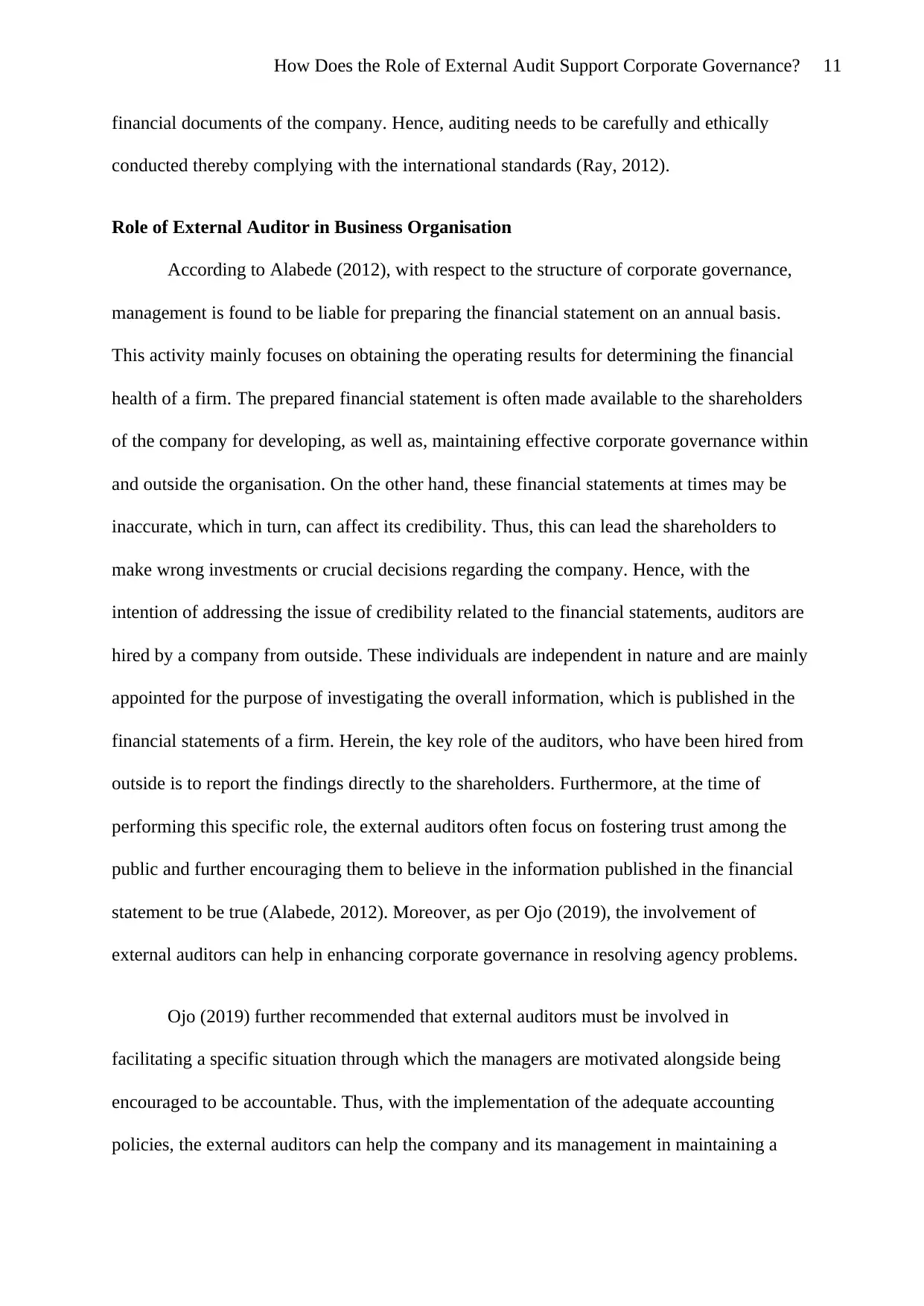
11How Does the Role of External Audit Support Corporate Governance?
financial documents of the company. Hence, auditing needs to be carefully and ethically
conducted thereby complying with the international standards (Ray, 2012).
Role of External Auditor in Business Organisation
According to Alabede (2012), with respect to the structure of corporate governance,
management is found to be liable for preparing the financial statement on an annual basis.
This activity mainly focuses on obtaining the operating results for determining the financial
health of a firm. The prepared financial statement is often made available to the shareholders
of the company for developing, as well as, maintaining effective corporate governance within
and outside the organisation. On the other hand, these financial statements at times may be
inaccurate, which in turn, can affect its credibility. Thus, this can lead the shareholders to
make wrong investments or crucial decisions regarding the company. Hence, with the
intention of addressing the issue of credibility related to the financial statements, auditors are
hired by a company from outside. These individuals are independent in nature and are mainly
appointed for the purpose of investigating the overall information, which is published in the
financial statements of a firm. Herein, the key role of the auditors, who have been hired from
outside is to report the findings directly to the shareholders. Furthermore, at the time of
performing this specific role, the external auditors often focus on fostering trust among the
public and further encouraging them to believe in the information published in the financial
statement to be true (Alabede, 2012). Moreover, as per Ojo (2019), the involvement of
external auditors can help in enhancing corporate governance in resolving agency problems.
Ojo (2019) further recommended that external auditors must be involved in
facilitating a specific situation through which the managers are motivated alongside being
encouraged to be accountable. Thus, with the implementation of the adequate accounting
policies, the external auditors can help the company and its management in maintaining a
financial documents of the company. Hence, auditing needs to be carefully and ethically
conducted thereby complying with the international standards (Ray, 2012).
Role of External Auditor in Business Organisation
According to Alabede (2012), with respect to the structure of corporate governance,
management is found to be liable for preparing the financial statement on an annual basis.
This activity mainly focuses on obtaining the operating results for determining the financial
health of a firm. The prepared financial statement is often made available to the shareholders
of the company for developing, as well as, maintaining effective corporate governance within
and outside the organisation. On the other hand, these financial statements at times may be
inaccurate, which in turn, can affect its credibility. Thus, this can lead the shareholders to
make wrong investments or crucial decisions regarding the company. Hence, with the
intention of addressing the issue of credibility related to the financial statements, auditors are
hired by a company from outside. These individuals are independent in nature and are mainly
appointed for the purpose of investigating the overall information, which is published in the
financial statements of a firm. Herein, the key role of the auditors, who have been hired from
outside is to report the findings directly to the shareholders. Furthermore, at the time of
performing this specific role, the external auditors often focus on fostering trust among the
public and further encouraging them to believe in the information published in the financial
statement to be true (Alabede, 2012). Moreover, as per Ojo (2019), the involvement of
external auditors can help in enhancing corporate governance in resolving agency problems.
Ojo (2019) further recommended that external auditors must be involved in
facilitating a specific situation through which the managers are motivated alongside being
encouraged to be accountable. Thus, with the implementation of the adequate accounting
policies, the external auditors can help the company and its management in maintaining a
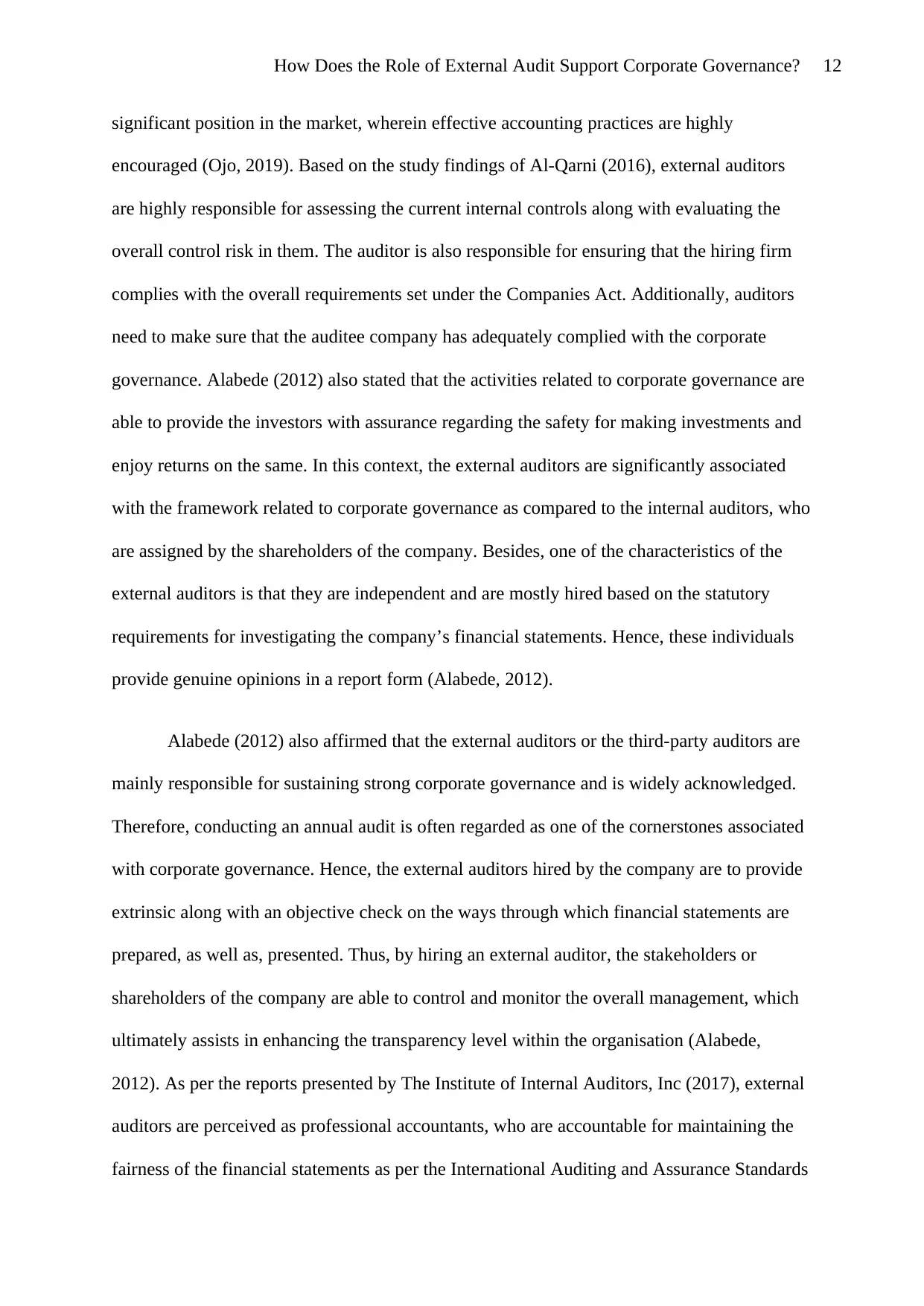
12How Does the Role of External Audit Support Corporate Governance?
significant position in the market, wherein effective accounting practices are highly
encouraged (Ojo, 2019). Based on the study findings of Al-Qarni (2016), external auditors
are highly responsible for assessing the current internal controls along with evaluating the
overall control risk in them. The auditor is also responsible for ensuring that the hiring firm
complies with the overall requirements set under the Companies Act. Additionally, auditors
need to make sure that the auditee company has adequately complied with the corporate
governance. Alabede (2012) also stated that the activities related to corporate governance are
able to provide the investors with assurance regarding the safety for making investments and
enjoy returns on the same. In this context, the external auditors are significantly associated
with the framework related to corporate governance as compared to the internal auditors, who
are assigned by the shareholders of the company. Besides, one of the characteristics of the
external auditors is that they are independent and are mostly hired based on the statutory
requirements for investigating the company’s financial statements. Hence, these individuals
provide genuine opinions in a report form (Alabede, 2012).
Alabede (2012) also affirmed that the external auditors or the third-party auditors are
mainly responsible for sustaining strong corporate governance and is widely acknowledged.
Therefore, conducting an annual audit is often regarded as one of the cornerstones associated
with corporate governance. Hence, the external auditors hired by the company are to provide
extrinsic along with an objective check on the ways through which financial statements are
prepared, as well as, presented. Thus, by hiring an external auditor, the stakeholders or
shareholders of the company are able to control and monitor the overall management, which
ultimately assists in enhancing the transparency level within the organisation (Alabede,
2012). As per the reports presented by The Institute of Internal Auditors, Inc (2017), external
auditors are perceived as professional accountants, who are accountable for maintaining the
fairness of the financial statements as per the International Auditing and Assurance Standards
significant position in the market, wherein effective accounting practices are highly
encouraged (Ojo, 2019). Based on the study findings of Al-Qarni (2016), external auditors
are highly responsible for assessing the current internal controls along with evaluating the
overall control risk in them. The auditor is also responsible for ensuring that the hiring firm
complies with the overall requirements set under the Companies Act. Additionally, auditors
need to make sure that the auditee company has adequately complied with the corporate
governance. Alabede (2012) also stated that the activities related to corporate governance are
able to provide the investors with assurance regarding the safety for making investments and
enjoy returns on the same. In this context, the external auditors are significantly associated
with the framework related to corporate governance as compared to the internal auditors, who
are assigned by the shareholders of the company. Besides, one of the characteristics of the
external auditors is that they are independent and are mostly hired based on the statutory
requirements for investigating the company’s financial statements. Hence, these individuals
provide genuine opinions in a report form (Alabede, 2012).
Alabede (2012) also affirmed that the external auditors or the third-party auditors are
mainly responsible for sustaining strong corporate governance and is widely acknowledged.
Therefore, conducting an annual audit is often regarded as one of the cornerstones associated
with corporate governance. Hence, the external auditors hired by the company are to provide
extrinsic along with an objective check on the ways through which financial statements are
prepared, as well as, presented. Thus, by hiring an external auditor, the stakeholders or
shareholders of the company are able to control and monitor the overall management, which
ultimately assists in enhancing the transparency level within the organisation (Alabede,
2012). As per the reports presented by The Institute of Internal Auditors, Inc (2017), external
auditors are perceived as professional accountants, who are accountable for maintaining the
fairness of the financial statements as per the International Auditing and Assurance Standards
⊘ This is a preview!⊘
Do you want full access?
Subscribe today to unlock all pages.

Trusted by 1+ million students worldwide
1 out of 20
Related Documents
Your All-in-One AI-Powered Toolkit for Academic Success.
+13062052269
info@desklib.com
Available 24*7 on WhatsApp / Email
![[object Object]](/_next/static/media/star-bottom.7253800d.svg)
Unlock your academic potential
Copyright © 2020–2026 A2Z Services. All Rights Reserved. Developed and managed by ZUCOL.




